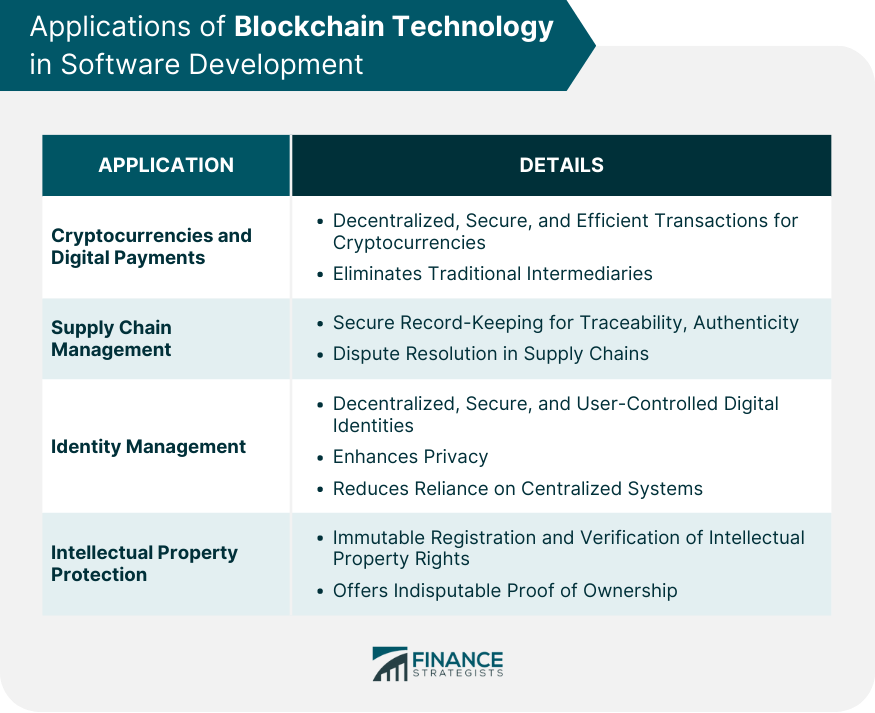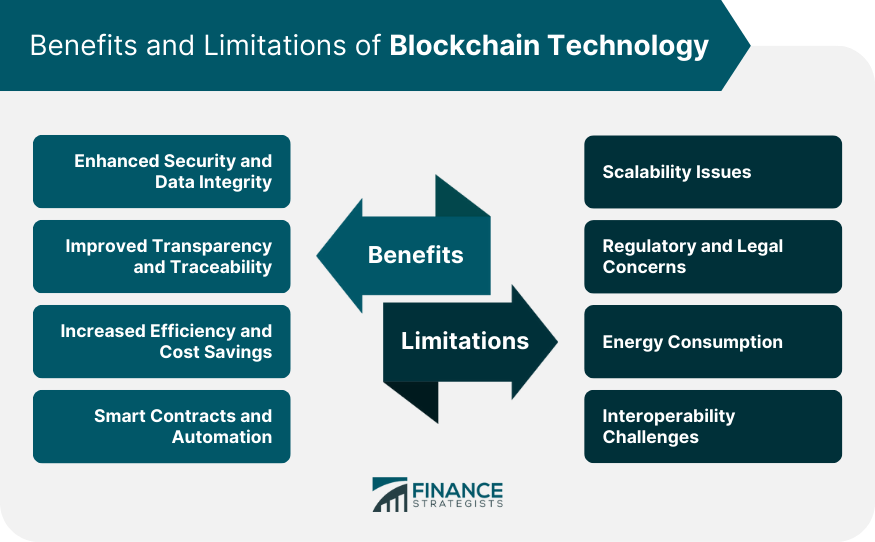Blockchain technology, an invention that shook the digital world, has its roots in the field of software development. Initially popularized by Bitcoin, it has since emerged as a technology with implications far beyond cryptocurrencies. This peer-to-peer, decentralized ledger system's unique attributes make it an appealing choice for various software development applications. The blockchain is a continuously growing chain of blocks, each containing a record of transactions. It is maintained across multiple computers linked in a peer-to-peer network. This technology has the ability to prevent unauthorized access, tampering, or revision, making it highly secure. It's these qualities that have been seized upon by software developers, extending blockchain's reach into areas such as supply chain management, identity verification, and more. By providing a secure and transparent way to record transactions of any type, blockchain can fundamentally change how we build and use applications. With data breaches and cyber-attacks becoming more commonplace, blockchain technology's enhanced security and decentralized nature can help alleviate these concerns. By leveraging blockchain, software developers can deliver applications with greater transparency, accountability, and data integrity. Blockchain technology also enables the creation of innovative business models and opens up new opportunities for developers, particularly in areas like decentralized finance, digital rights management, and secure sharing of resources. Cryptocurrencies like Bitcoin and Ethereum have revolutionized the financial industry by providing a decentralized, secure, and efficient method of transferring value. Notably, blockchain technology enables peer-to-peer transactions, allowing for direct, digital transfer of value. This facilitates faster, more efficient payments, especially across borders, and eliminates the need for traditional banking intermediaries. As a result, software developers have been able to build a plethora of applications for trading, investing, and transacting in cryptocurrencies. Blockchain's ability to provide a secure, immutable record of transactions makes it an ideal solution for supply chain management. By implementing blockchain, businesses can gain unprecedented visibility into their supply chain, ensuring the authenticity of goods and preventing fraud. Through blockchain, every product's journey can be tracked from source to consumer, and this information can be made accessible to all participants. This allows for enhanced traceability, verification of product authenticity, and quicker resolution of disputes. The potential of blockchain in supply chain management has spurred software developers to create platforms and solutions catering to this need. Traditional identity systems are often centralized and susceptible to breaches, identity theft, and fraud. However, blockchain technology can help mitigate these risks by offering a decentralized, secure, and tamper-proof system for digital identities. With blockchain, each user can control their digital identity, reducing reliance on third-party providers and enhancing privacy. The technology provides for robust identity verification processes, which software developers are using to build more secure, user-friendly identity management solutions. The immutable nature of blockchain makes it an ideal solution for registering and verifying intellectual property rights. It can provide indisputable proof of ownership and creation time, which is crucial in copyright disputes. For instance, artists and creators can register their work on a blockchain, creating a timestamped, unalterable record of their creation. This offers a new way of managing and protecting intellectual property rights and opens up fresh possibilities for software developers in creating blockchain-based registration and tracking solutions. The decentralized and immutable nature of blockchain makes it virtually impossible for hackers to alter or manipulate data. Every transaction recorded on a blockchain is cryptographically sealed and linked to previous transactions. This chain of transactions, spread across multiple nodes, makes blockchain resistant to tampering, ensuring data integrity. By leveraging blockchain, software developers can build more secure applications, instilling confidence in end-users about the security and reliability of their data. Blockchain offers unparalleled transparency and traceability, which can significantly enhance accountability in various applications. As every transaction is recorded on the blockchain and visible to all network participants, it creates a transparent and trustworthy system. This transparency can be particularly beneficial in sectors such as finance, supply chain, and public services where accountability and traceability are crucial. By harnessing the transparency inherent in blockchain, software developers can create solutions that foster trust and enhance efficiency. Blockchain technology can also lead to increased efficiency and cost savings in software development. By eliminating intermediaries and automating processes through smart contracts, blockchain can streamline transactions and reduce costs. For instance, in financial transactions, blockchain can enable direct peer-to-peer transfers, reducing transaction times from days to minutes. This efficiency, coupled with the cost savings from eliminating intermediaries, can translate to substantial benefits. By integrating blockchain into their applications, software developers can offer their users faster, cheaper, and more efficient services. The advent of smart contracts, programmable contracts that self-execute when predetermined conditions are met, represents one of the most compelling uses of blockchain technology in software development. These autonomous contracts not only automate processes but also ensure the enforcement of the agreed-upon terms. From automating insurance claims to managing digital rights, the applications of smart contracts are vast. They hold the potential to significantly streamline operations across a range of industries, and software developers are at the forefront of creating innovative applications harnessing the power of smart contracts. As the number of transactions increases, the size of the blockchain grows, leading to slower transaction times and increased storage requirements. Current public blockchains like Bitcoin and Ethereum can only process a limited number of transactions per second, which is far less than traditional payment systems like Visa. Overcoming this scalability issue is a major focus for software developers working with blockchain, with various solutions like sharding and off-chain transactions being explored. Regulatory and legal concerns are another significant limitation of blockchain technology in software development. The decentralized nature of blockchain, while one of its strengths, also creates regulatory challenges, as it can be difficult to apply traditional legal frameworks to blockchain transactions. In many jurisdictions, the legal status of blockchain transactions, smart contracts, and decentralized applications is unclear. This regulatory uncertainty can hinder the adoption and development of blockchain applications. Software developers must navigate these regulatory complexities when integrating blockchain into their solutions. The energy consumption of blockchain, particularly those using proof-of-work consensus mechanisms like Bitcoin, is a significant concern. These blockchains require a large amount of computational power, leading to substantial energy consumption. This not only raises environmental concerns but also limits the practicality of such blockchains for some applications. As a result, there is a growing interest in more energy-efficient consensus mechanisms like proof of stake, and software developers working with blockchain technology need to consider energy consumption when designing their solutions. With many different blockchain networks in existence, each with its own protocols and standards, there is a need for these networks to communicate and interact with each other. However, achieving interoperability between different blockchains is complex and presents technical challenges. Software developers are working on solutions to this problem, such as cross-chain communication protocols and blockchain bridges, but it remains a significant hurdle to the broader adoption of blockchain technology. Blockchain technology has revolutionized software development by providing a secure, transparent, and efficient way to record transactions. Its applications span various domains, including cryptocurrencies, supply chain management, identity management, and intellectual property protection. By leveraging blockchain, software developers can enhance security and data integrity, improve transparency and traceability, increase efficiency, and automate processes through smart contracts. However, there are limitations to consider. Scalability issues, regulatory and legal concerns, energy consumption, and interoperability challenges pose hurdles to widespread blockchain adoption. As software developers continue to explore its applications and address its limitations, blockchain technology is poised to shape the future of software development and revolutionize various sectors.Overview of Blockchain Technology in Software Development
Importance of Blockchain Technology in Software Development
Applications of Blockchain Technology in Software Development
Cryptocurrencies and Digital Payments
Supply Chain Management
Identity Management
Intellectual Property Protection

Benefits of Blockchain Technology in Software Development
Enhanced Security and Data Integrity
Improved Transparency and Traceability
Increased Efficiency and Cost Savings
Smart Contracts and Automation
Limitations of Blockchain Technology in Software Development
Scalability Issues
Regulatory and Legal Concerns
Energy Consumption
Interoperability Challenges

Conclusion
Blockchain Technology in Software Development FAQs
Blockchain is a decentralized, distributed ledger technology that records transactions across multiple computers to ensure security and transparency.
Blockchain technology is important in software development due to its enhanced security, transparency, and ability to automate processes through smart contracts. It also enables innovative business models and opens up new opportunities for developers.
Blockchain has various applications in software development, including cryptocurrencies and digital payments, supply chain management, identity management, and intellectual property protection.
The benefits of using blockchain technology in software development include enhanced security and data integrity, improved transparency and traceability, increased efficiency and cost savings, and automation through smart contracts.
Some limitations of blockchain technology in software development include scalability issues, regulatory and legal concerns, high energy consumption, and interoperability challenges.
True Tamplin is a published author, public speaker, CEO of UpDigital, and founder of Finance Strategists.
True is a Certified Educator in Personal Finance (CEPF®), author of The Handy Financial Ratios Guide, a member of the Society for Advancing Business Editing and Writing, contributes to his financial education site, Finance Strategists, and has spoken to various financial communities such as the CFA Institute, as well as university students like his Alma mater, Biola University, where he received a bachelor of science in business and data analytics.
To learn more about True, visit his personal website or view his author profiles on Amazon, Nasdaq and Forbes.















